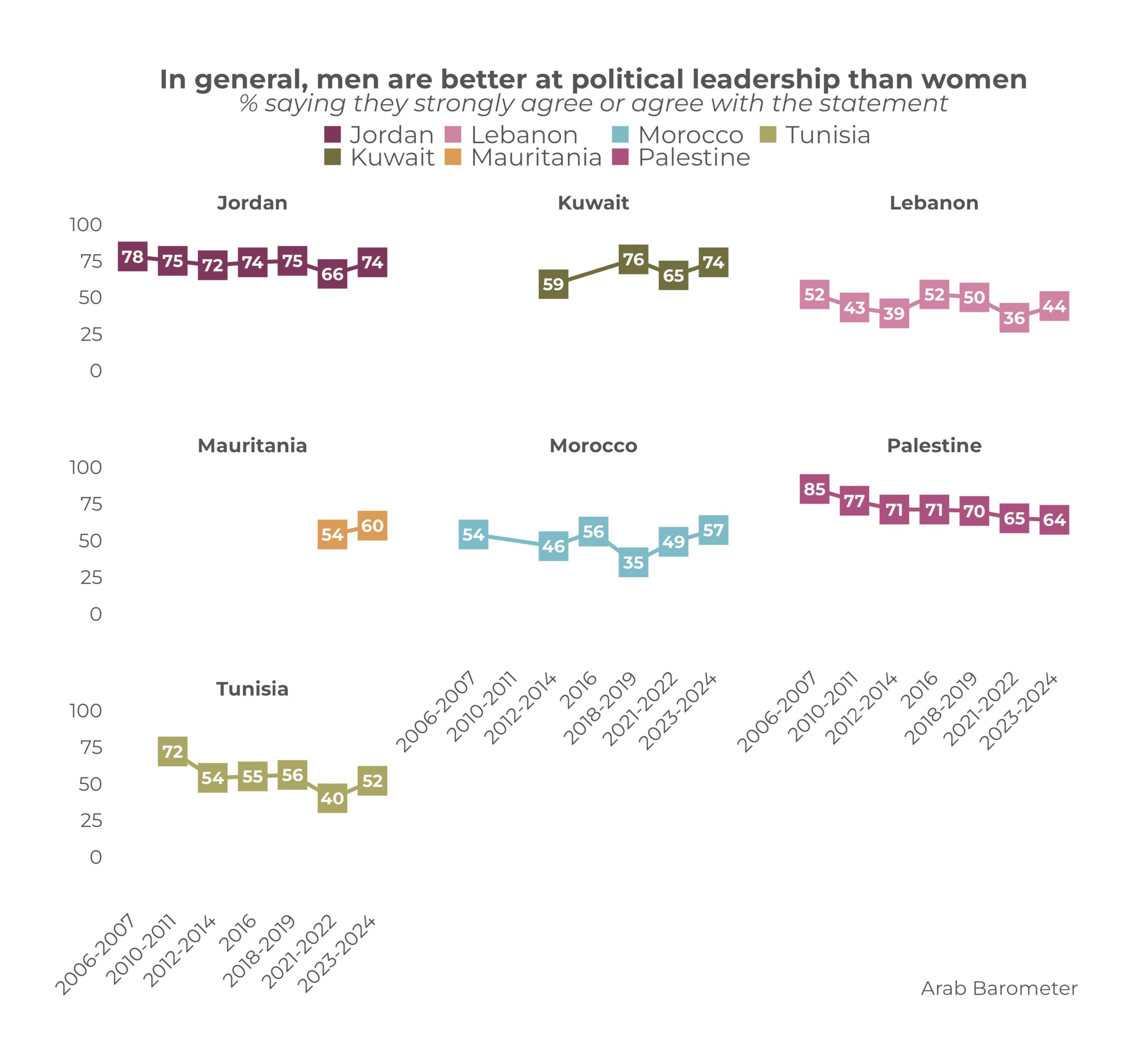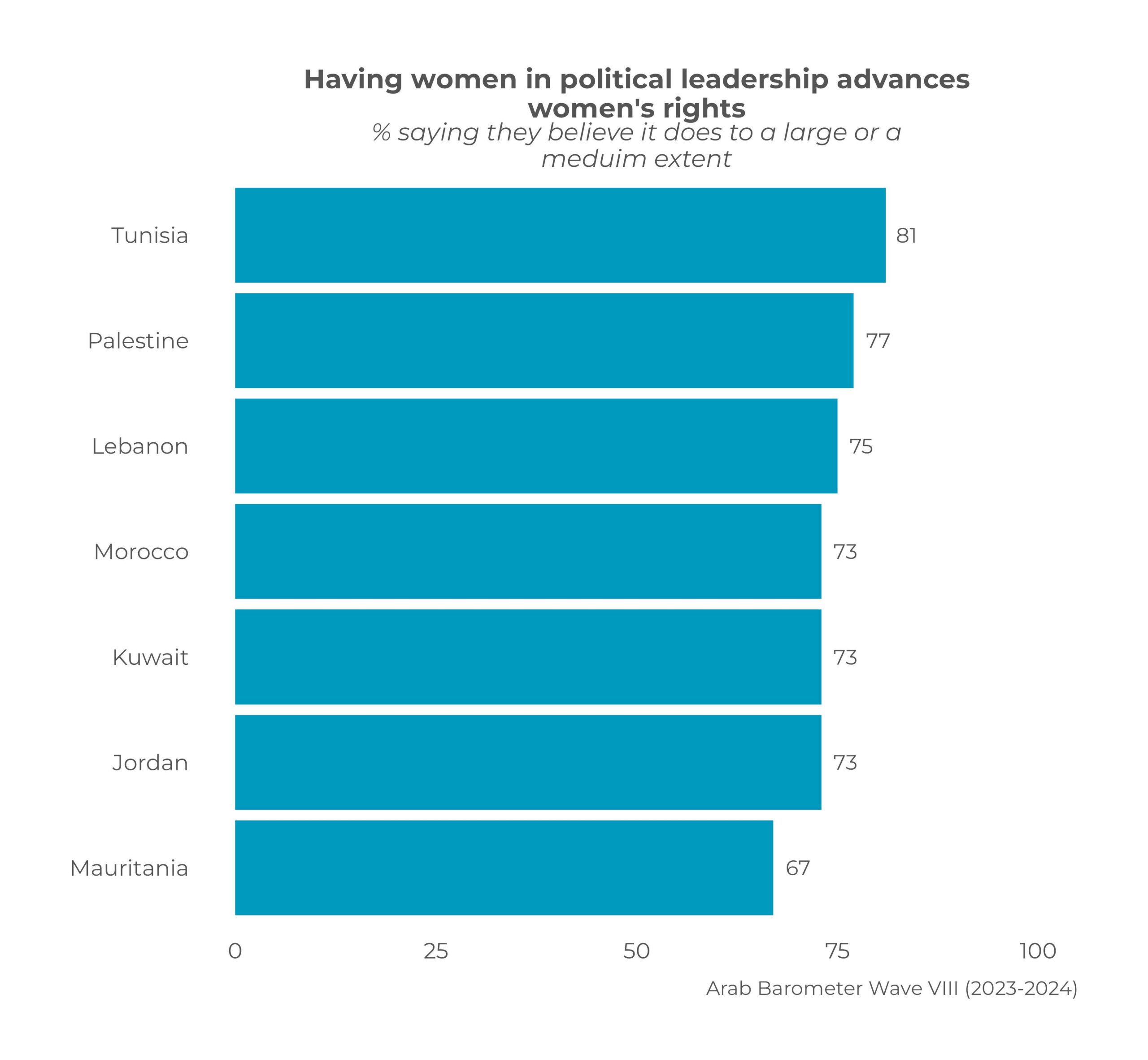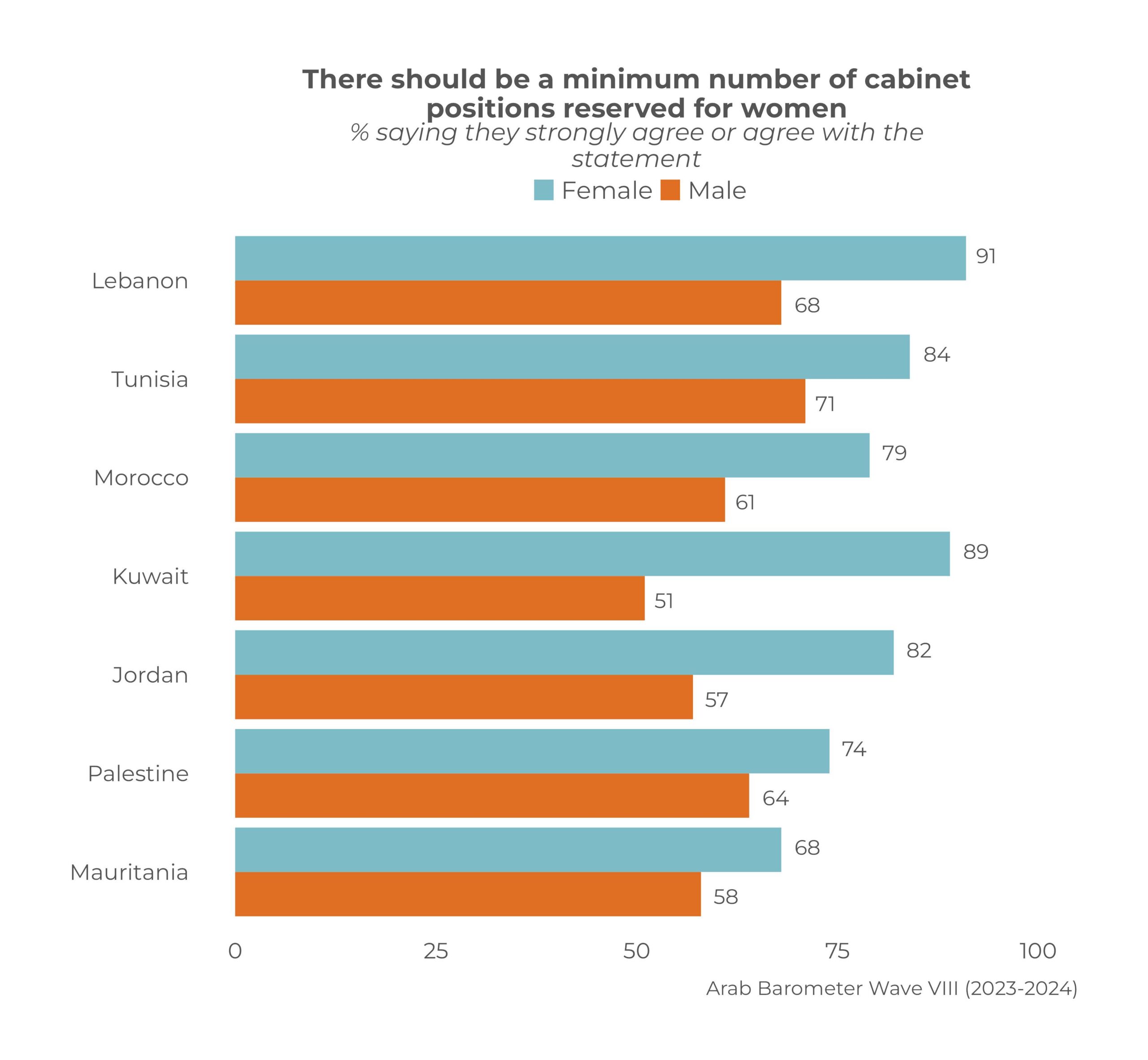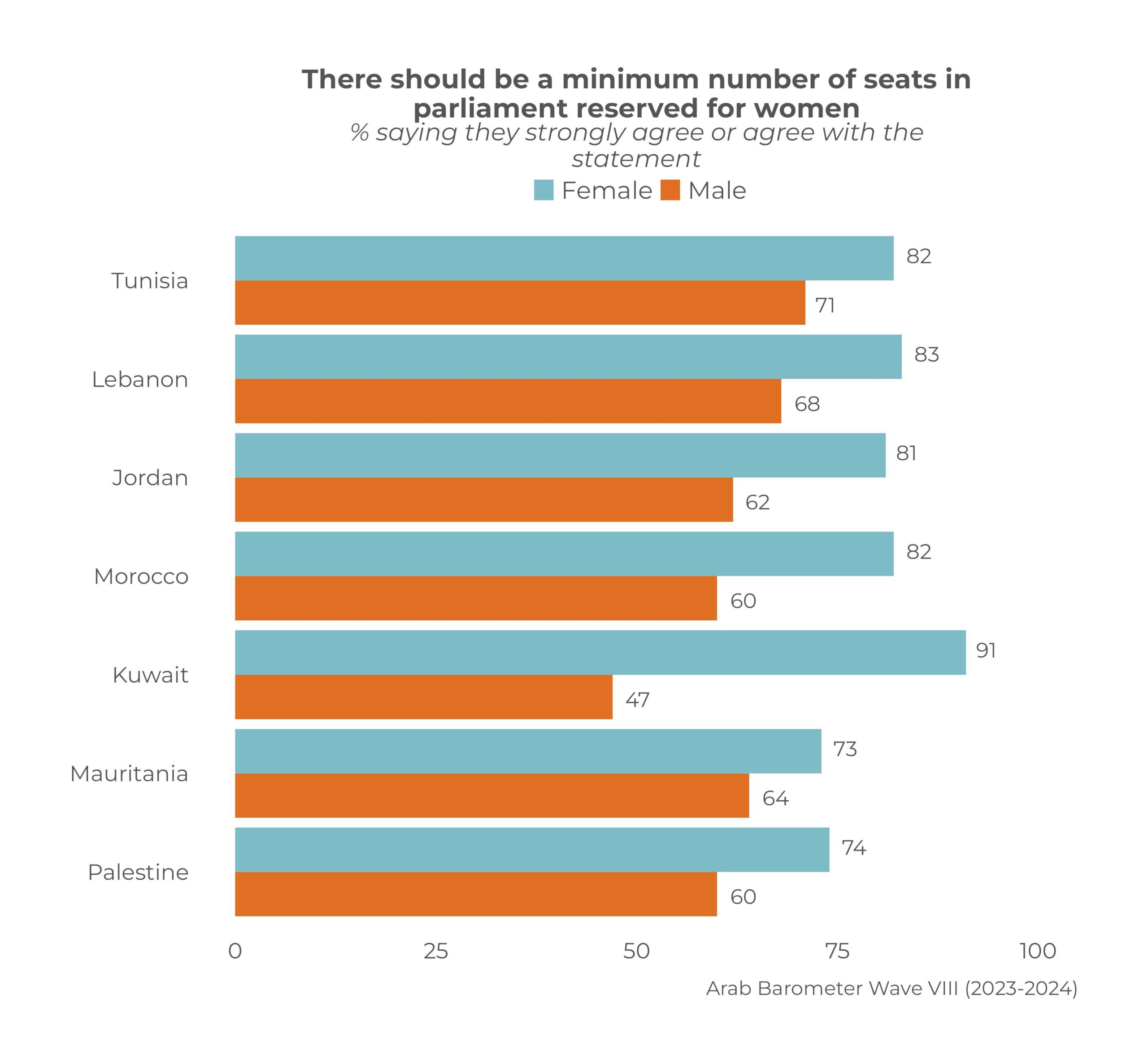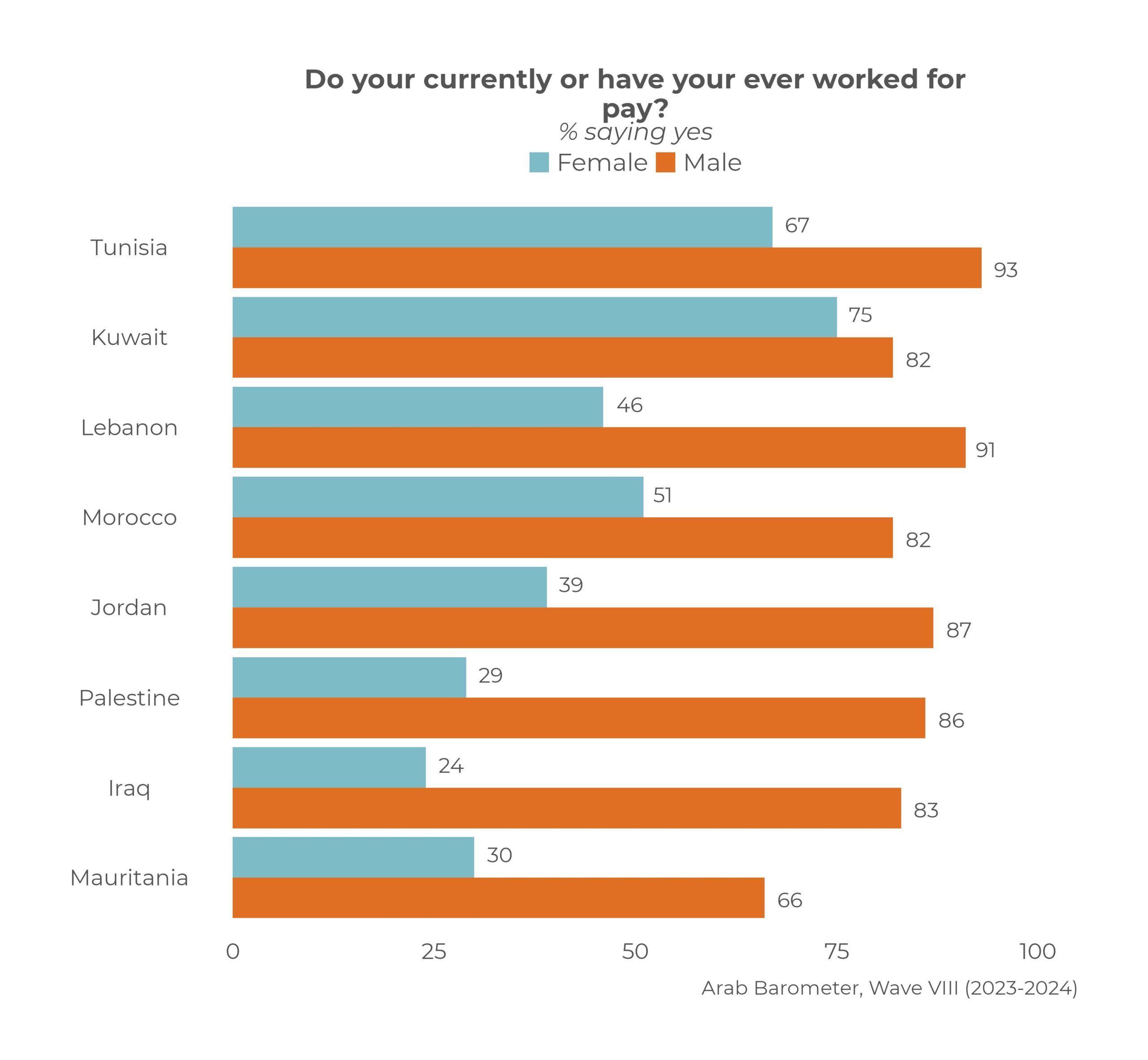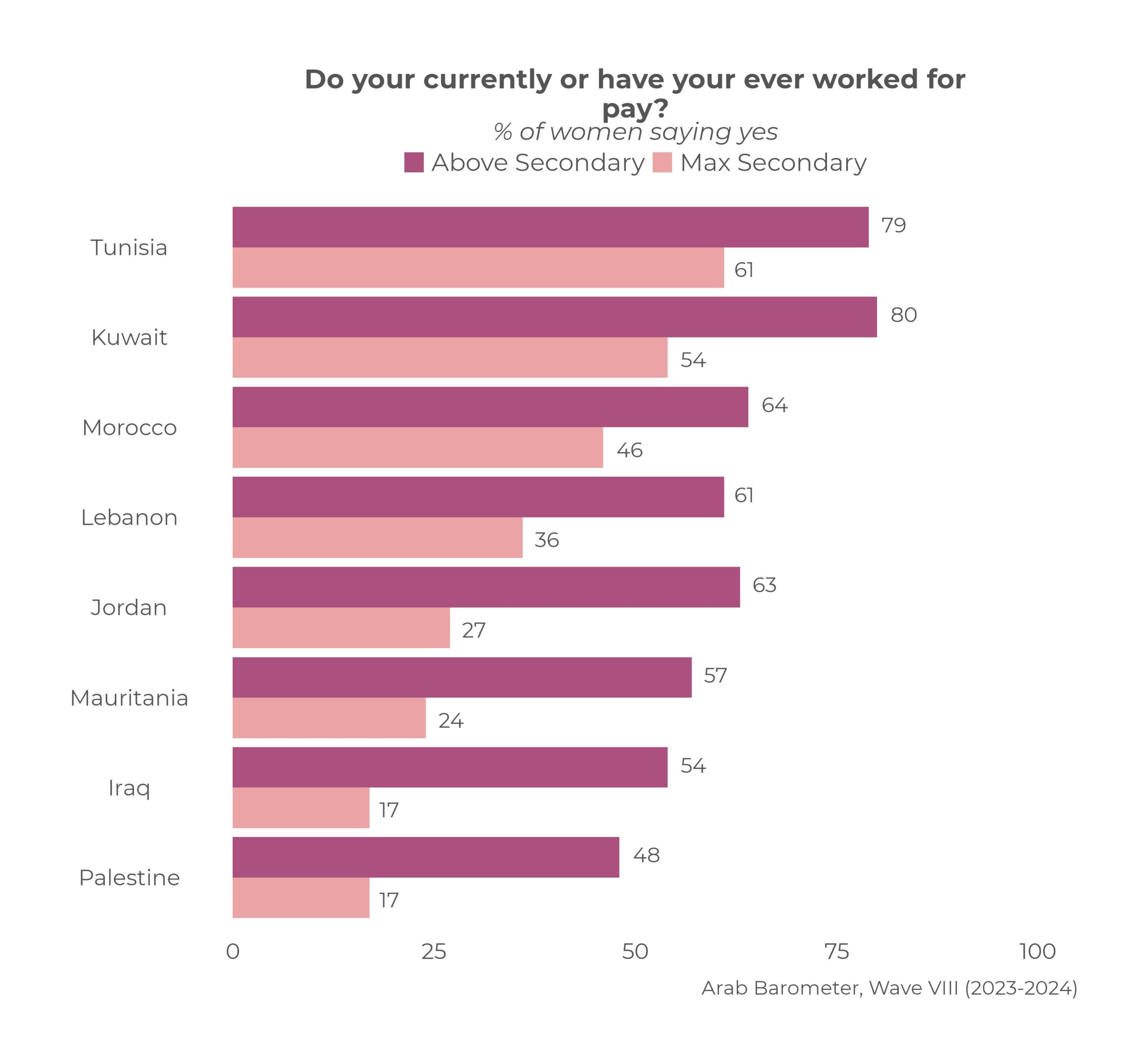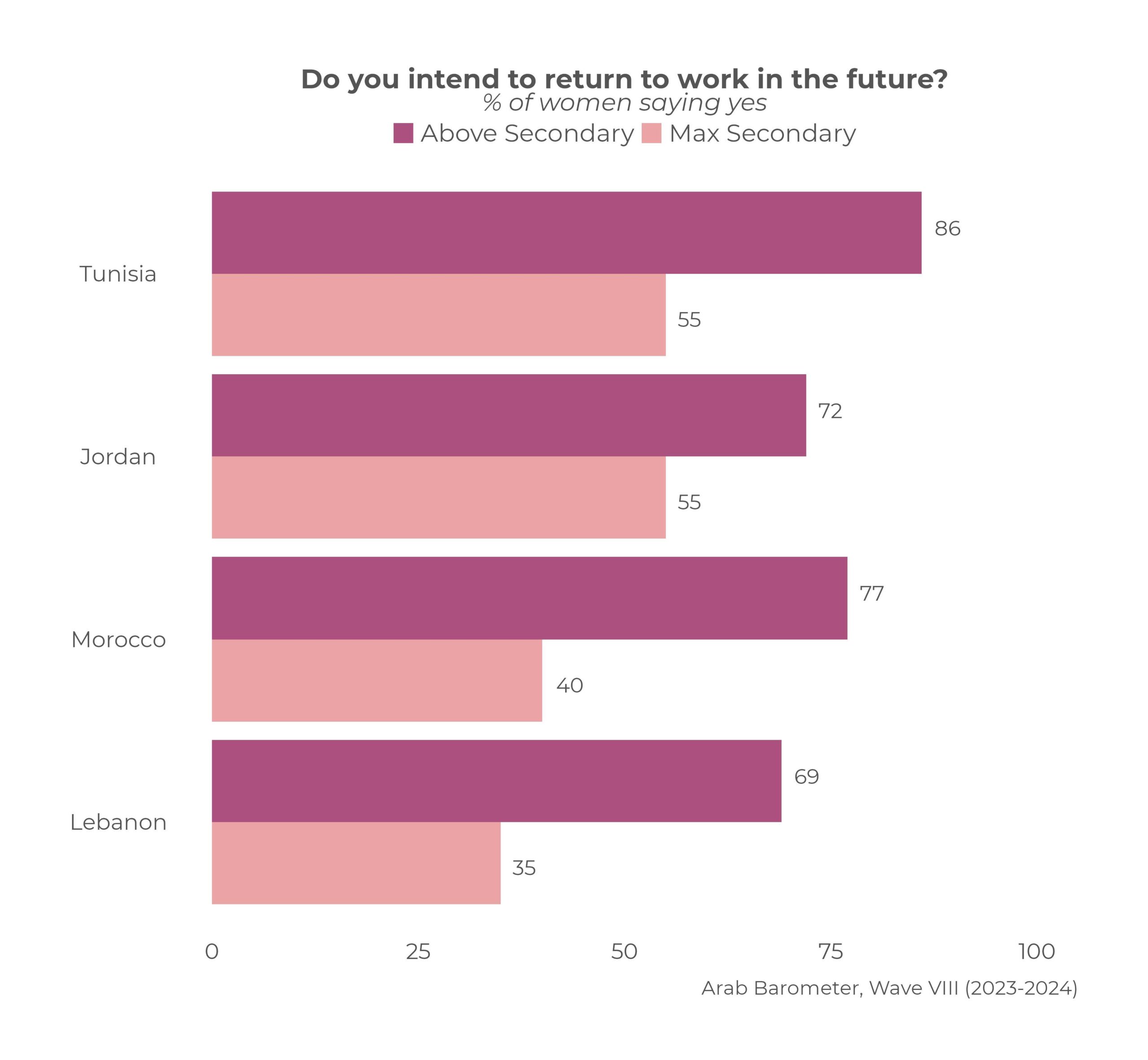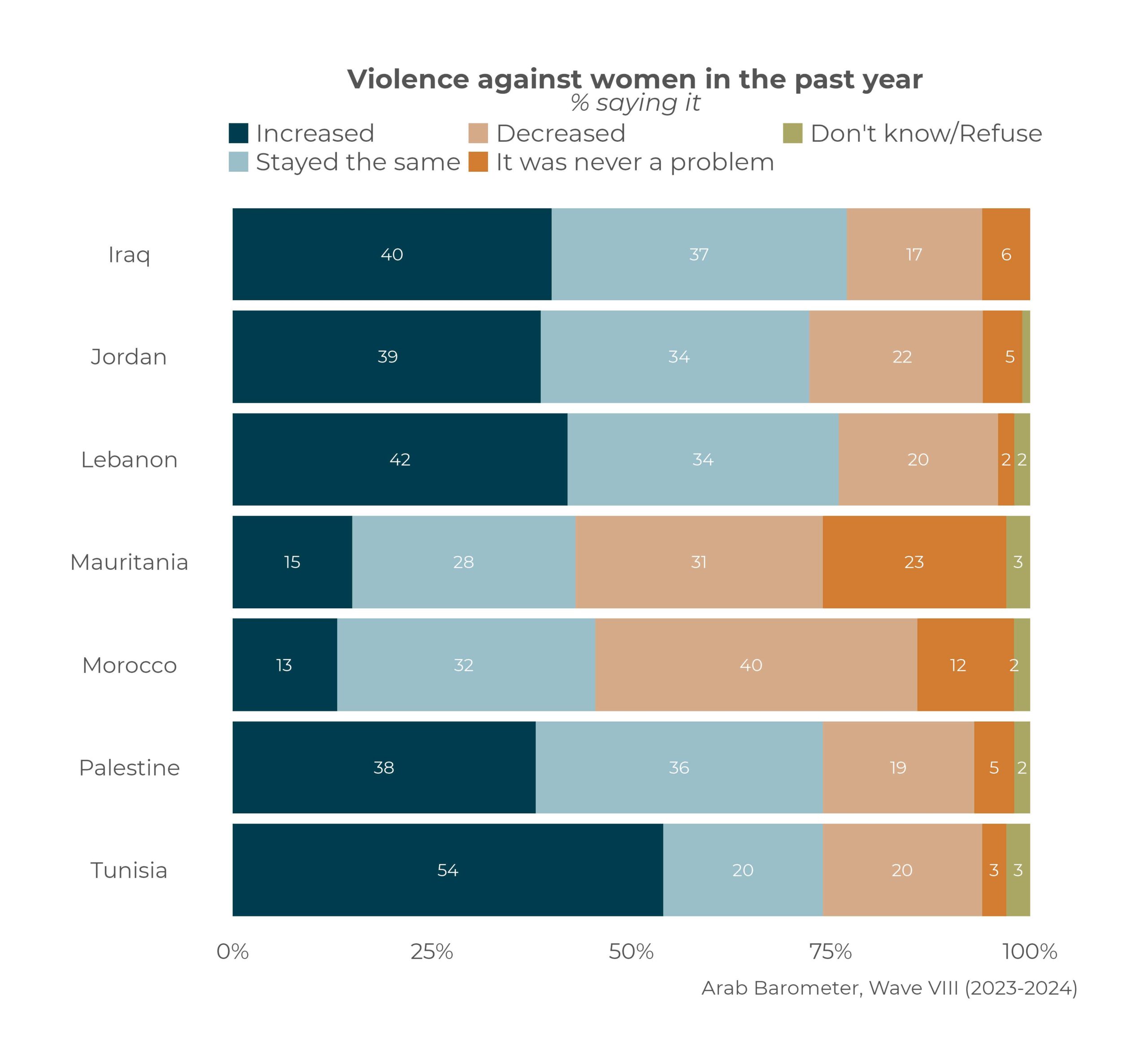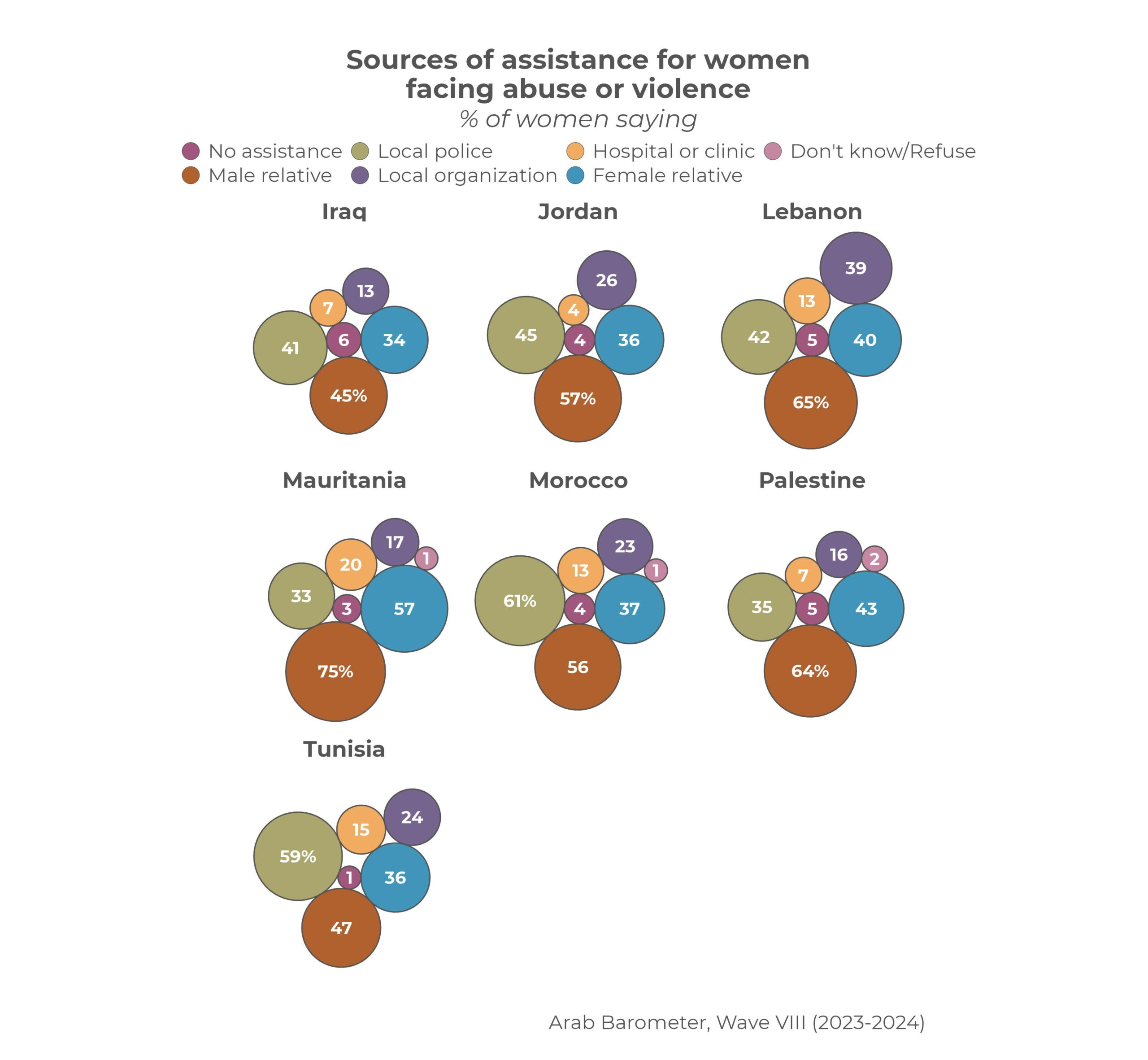For Immediate Release
**Please credit Arab Barometer**
In recognition of International Women’s Day on March 8, Arab Barometer presents findings from its latest Wave VIII survey (2023–2024), offering insights into public attitudes toward women’s roles in home life, political leadership, workforce participation, and gender-based violence across the Middle East and North Africa (MENA) region.
Authored by Dr. MaryClare Roche, Director of Technology and Innovation at Arab Barometer, the report reveals a notable shift from previous trends, with growing support for patriarchal norms in both private and public spheres compared to the 2021–2022 survey. At the same time, findings point to areas of progress, including backing for women’s political participation and economic empowerment in some contexts. These results highlight both advances and persistent challenges in achieving gender equality across the region.
Key Findings:
Views on Women’s Political Participation in MENA
- Growing Preference for Male Political Leadership: Between 2021 and 2024, the belief that “men are better at political leadership” has risen in six of seven MENA countries, returning to or exceeding levels from a decade ago. Palestine is the exception, where support continues to decline. Notably, in Jordan and Kuwait, 74% agree with this view; in Mauritania, 60%; Morocco, 57%; Tunisia, 52%; Palestine, 64%; and Lebanon, 44%.
- Notable Shifts in Support for Male Leadership: Women in several MENA countries saw greater increases than men in the belief that men are better political leaders. In Kuwait, women’s support increased by 13 points, in Tunisia by 12 points, in Jordan by 10 points, in Morocco by 10 points, and in Mauritania by 9 points. In Tunisia, the increase was nearly equal for both men and women (12 points) compared to men (11 points).
- Persistent Gender Gap: Despite these shifts, MENA women are consistently more likely than MENA men to disagree with the notion that men are better political leaders. In Lebanon, men and women have the most divergent opinions; women are 24 points less likely than men to agree. Notably, Lebanese men (56%) show the lowest levels of agreement compared to men in other surveyed countries.
- Support for Women’s Political Participation: Majorities in all surveyed countries believe that having female political leaders advances women’s rights. On average, women are 15 percentage points more likely than men to hold this belief.
- Backing for Gender Quotas: There is strong support for gender quotas in politics, with the majority of MENA citizens favoring reserving seats for women in cabinets and parliaments.
- Political Engagement and Support for Women in Politics: In countries like Palestine, Morocco, and Mauritania, men with strong political engagement—including voting and party affiliation—are more likely to support women’s participation in politics. This signals to policymakers that gender-inclusive reforms, aimed at increasing women’s political participation, would be supported by engaged citizens, including voters.
Quote: “Despite reservations among MENA citizens about women’s leadership capabilities, there is a clear public desire to increase women’s political representation, recognizing the need for formal mechanisms to advance gender equality.” — Dr. MaryClare Roche, Director of Technology and Innovation, Arab Barometer Education and Working Women in MENA
Education and Working Women in MENA
- Gender Parity in Education vs. Workforce Disparity: Six out of seven MENA countries surveyed in Arab Barometer’s 2023-2024 survey exceed the world average for gender parity in higher education, with Mauritania being the exception (source: World Bank). However, Arab Barometer’s survey data reveals that women continue to face a significant labor force participation gap, with an average 38 percentage point difference between men and women who have ever held a job. This gap widens to over 43 points when excluding Kuwait, a regional outlier.
- Higher Education Drives Women’s Workforce Participation: Arab Barometer’s 2023-2024 survey shows that women with higher education are, on average, 28 percentage points more likely to have ever worked compared to those with only secondary education. The gap is smallest in Tunisia and Morocco (18 points) and largest in Iraq and Jordan (37 and 36 points, respectively). In contrast, the employment gap between men with more or less education is only 4 percentage points on average.
- Stronger Intent to Rejoin the Workforce: Women with higher education are significantly more likely to return to work after a career break. In Morocco, Lebanon, Tunisia, and Jordan, the gap between those with higher education and those with secondary education or less who say they intend to return to work in the future is 37, 34, 31, and 17 points, respectively.
Quote: Dr. MaryClare Roche, Director of Technology and Innovation at Arab Barometer, emphasizes, “While higher education alone may not fully bridge the gap, it is essential for MENA women’s participation in the labor market. The significant difference in workforce participation based on education highlights the need to continue encouraging women towards higher education, as it remains a crucial factor for their employment opportunities.”
Gender-Based Violence: Public Concern and Perceptions of Support
- Increase in Gender-Based Violence (GBV): In five of the seven surveyed MENA countries, a plurality of citizens report that violence against women has increased over the past year. Notably, Tunisia (54%), Lebanon (42%), Iraq (40%), Jordan (39%), and Palestine (38%) register the highest percentages. In contrast, a plurality in Morocco (40%) and Mauritania (31%) indicate that gender-based violence has decreased.
- Gender Gap in Perceptions: A pronounced gender divide emerges across the region. In Tunisia, 60% of women say violence has increased compared to 47% of men—a 13-point gap. Similar differences are evident in Jordan (+11 points), Iraq (+7 points), Lebanon (+6 points), and Palestine (+5 points). Uniquely, in Morocco, both women (42%) and men (39%) largely agree that violence has decreased. In Mauritania, 30% of women say violence has stayed the same, while 34% of men say it has decreased.
- Positive Trend Over Time: Since Arab Barometer Wave VII (2021–2022), the percentage of women reporting an increase in violence has fallen markedly: Palestine (-16 points), Jordan (-15 points), Morocco (-14 points), Iraq (-14 points), and Tunisia (-9 points). Moreover, more citizens in Wave VIII (2023–2024) now indicate that violence has decreased.
- Family as the Primary Support: In the Middle East and North Africa (MENA) region, many women perceive gender-based violence as a deeply personal issue, with family serving as the primary source of support. In Mauritania (75%), Lebanon (65%), Palestine (64%), Jordan (57%), and Morocco (56%), a significant majority of women believe that women facing abuse or violence seek assistance from male relatives rather than public institutions.
- Trust in Public Support Systems: Confidence in formal support systems varies across the region. In Morocco (61%) and Tunisia (59%), the majority of women believe that women facing gender-based violence can seek assistance from the police. In Jordan (45%), Lebanon (42%), and Iraq (41%), the police are the second most common choice among women, after male relatives. In contrast, 35% of women in Palestine and 33% in Mauritania see the police as the primary support for abused women, but are more likely to turn to family members for help.
- Non-governmental organizations (NGOs) are also viewed as viable resources, with 39% of Lebanese women, 26% of Jordanian women, and 24% of women in Tunisia and 23% in Morocco believing NGOs can provide assistance. In contrast, only 17% of women in Mauritania, 16% in Palestine, and 13% in Iraq share this view.
Quote: “While citizens are highly unlikely to say that a woman facing abuse cannot find support, the most commonly cited sources of assistance are familial rather than institutional. Relying on family for support is complex; at best, the lack of institutional backing may suggest that citizens do not view the government as particularly invested in supporting women facing gender-based violence. Increasing institutionalized support through funding and outreach with local organizations or healthcare facilities could provide more security for abused women.” — Dr. MaryClare Roche, Director of Technology and Innovation, Arab Barometer
Additional Resources
For more in-depth insights, please refer to the following reports and blogs authored by MaryClare Roche, PhD:
- Gender Attitudes and Trends in MENA: The Effects of Working Women (Report)
- Education and Working Women in MENA (Blog)
- Gender-Based Violence and Sources of Support (Report)
- For a comprehensive overview of the Arab Barometer’s 2024 Gender Report, you can watch the launch event at the Wilson Center here.
- For insights on the latest gender attitudes in Tunisia, including barriers to women’s participation in politics and the economy, and potential policy solutions, watch the Wilson Center’s interview with Aseel Alayli, Arab Barometer’s Director of Global Communications, here.
Additional Resources
For more in-depth insights, please refer to the following reports and blogs authored by MaryClare Roche, PhD:
- Gender Attitudes and Trends in MENA: The Effects of Working Women (Report)
- Education and Working Women in MENA (Blog)
- Gender-Based Violence and Sources of Support (Report)
- For a comprehensive overview of the Arab Barometer’s 2024 Gender Report, you can watch the launch event at the Wilson Center here.
- For insights on the latest gender attitudes in Tunisia, including barriers to women’s participation in politics and the economy, and potential policy solutions, watch the Wilson Center’s interview with Aseel Alayli, Arab Barometer’s Director of Global Communications, here.
Please credit Arab Barometer in any dissemination.
ENDS //
Arab Barometer Media Resources
For more information or to schedule an interview with Dr. MaryClare Roche, please contact Aseel Alayli, Director of Brand, Marketing and Global Communications, at aalayli@princeton.edu.
• Website: www.arabbarometer.org
• Resources for Media: www.arabbarometer.org/media-news
• FAQ: www.arabbarometer.org/frequently-asked-questions
• About Arab Barometer: www.arabbarometer.org/about
• Methodology: www.arabbarometer.org/survey-data/methodology
